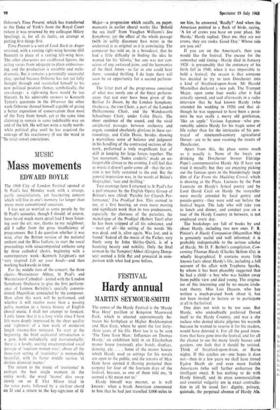Hardy annual
FESTIVAL MARTIN SEYMOUR-SMITH
The centre of the Hardy Festival is the 'Hardy Was Here' pavilion at Kingston Maurward Park, which is situated approximately be- tween his birthplace at Higher Bockhampton and Max Gate, where he spent the last forty- three years of his life. Here too is to be seen 'The Time Torn Man: Influences on Thomas Hardy,' an exhibition held in an Elizabethan manor house (restored), plus bands, displays, dancing, etc. . . . Some of the manor houses which Hardy used as settings for his novels are open to the public, and the tenants of Max Gate have opened it (having protected their carpets) for four of the fourteen days of the festival, because, as one of them told me, 'it seemed a bit mean not to.'
Hardy himself was meaner, as is well known: when a brash American announced to him that he had just travelled 3,000 miles to see him, he answered, 'Really?' And when the American pointed to a flock of birds, saying,
'A lot of crows you have on your place, Mr Hardy,' Hardy replied, 'Dear me, they are not crows, they are rooks. Good Day.' Whose side are you on?
If you are on the American's, then you would like the festival. The excuse for the somewhat odd timing—Hardy died in January 1928—is presumably that the centenary of his birth fell in 1940, when it was impossible to hold a festival; the reason is that someone has decided to try to turn Dorchester into a kind of Stratford-upon-Avon. Mr Harold Macmillan declared a new pub, The Trumpet Major, open some four weeks after it had actually opened, and said afterwards in a radio interview that he had known Hardy (who attended his wedding in 1920) and that al- though he was supposed to have been a pessi- mist he was really a merry old gentleman, 'like an apple.' Various Japanese—who pre- sumably admire Hardy for his tragic sense of life rather than for the intricacies of his por- trayal of nineteenth-century agricultural Dorset—are to be seen roaming the streets of Dorchester.
Apart from this, the place seems much as it usually is. None of the locals are
drinking the Dorchester brewer Eldridge Pope's commemorative Hardy Ale (I have not tried it myself); but they are enjoying picking out the famous spots in the blunderingly inept
film of Far From the Madding Crowd, which is showing at the Plaza. Lectures by the Poet
Laureate on Hardy's lyrical poetry and by Lord David Cecil on Hardy the storyteller were mostly attended by local gentry and
pseudo-gentry—they were sold out before the festival began. The lady who will take you to lunch and dinner, and conduct you on a tour of the Hardy Country in between, is not employed every day.
The bookshops are full of books by and about Hardy, including two new ones. F. B.
Pinion's A Hardy Companion (Macmillan 90s)
is genuinely useful and well informed; it is probably indispensable to the serious scholar
of Hardy. Mr D. F. Barber's compilation, Con- cerning Thomas Hardy (Charles Skilton 42s), is wholly biographical. It contains many little
known facts about Hardy's life, including a full account of his affair with Tryphena Sparks, by whom it has been plausibly suggested that he had a child—a boy who was hidden away from public view and died young. The origina- tor of this interesting and by no means irrele- vant theory, Miss Lois Deacon, who has written a much-praised book about it, has not been invited to lecture or to participate at all in the festival.
One dOes not wish to be too sour. But Hardy, who undoubtedly preferred Dorset
itself to the Hardy Country, and was a shy recluse who denied idiotic pilgrims his warmth because he wanted to reserve it for his readers, would have detested it. For all the good inten- tions that have gone into the festival, and for all the chance to see the many lovely houses and gardens, one feels that it should be resisted.
Think of Stratford-upon-Avon, or Burns nights. If this catches on—one hopes it does not—then in a few years we shall have tinned Egdon Heath air and even more foolish Americans (who will further embarrass the
intelligent ones). It has nothing to do with Hardy himself, and its crass commercialism and essential vulgarity are in exact contradic- tion to all he stood for: dignity, privacy, quietude, the perpetual absence of Hardy Ala.






































 Previous page
Previous page